Rohingya Muslims Should Not be Allowed to Settle in India
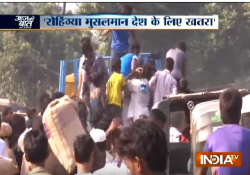 Already the jihadi groups in Pakistan are girding up their loins to take ‘revenge’ for the atrocities committed on Rohingya Muslims in Myanmar. Hate speeches are already being made at mosques in Pakistan and terror conspiracies are afoot. I had made it very clear that there are some extremists among Rohingya Muslims, who have contacts with terrorists in the subcontinent. Already we, as a nation, have many problems, and we need not add one more problem from our neighbors. It is also true that the issue of stateless Rohingyas needs to be seen through the prism of humanity, and every country should help these unfortunate people. But helping them does not mean that Rohingya Muslims should be allowed to settle in India. Our first attempt should be: to speak to the Myanmar government to ensure that conditions improve in Rakhine state, where most of the Rohingyas live. We can provide them humanitarian aid like food, medicines, etc, but allowing them to settle in India will not be a wise step. I, therefore, support our government’s stand which was amply made clear by the Home Ministry in its affidavit before the Supreme Court on Monday.
Already the jihadi groups in Pakistan are girding up their loins to take ‘revenge’ for the atrocities committed on Rohingya Muslims in Myanmar. Hate speeches are already being made at mosques in Pakistan and terror conspiracies are afoot. I had made it very clear that there are some extremists among Rohingya Muslims, who have contacts with terrorists in the subcontinent. Already we, as a nation, have many problems, and we need not add one more problem from our neighbors. It is also true that the issue of stateless Rohingyas needs to be seen through the prism of humanity, and every country should help these unfortunate people. But helping them does not mean that Rohingya Muslims should be allowed to settle in India. Our first attempt should be: to speak to the Myanmar government to ensure that conditions improve in Rakhine state, where most of the Rohingyas live. We can provide them humanitarian aid like food, medicines, etc, but allowing them to settle in India will not be a wise step. I, therefore, support our government’s stand which was amply made clear by the Home Ministry in its affidavit before the Supreme Court on Monday.
Click Here for the Video
Virender Sehwag to India TV: I Was Never Interested in Coaching the Indian team

New Delhi, Sept 15: Former India opener Virender Sehwag has revealed that he was never interested in coaching the Indian cricket team and he would not have applied for the job had he known Ravi Shastri would also file his application.
The 38-year-old player – one of India’s greatest game changers – was touted as one of the top contestants for the Indian Cricket Team coach’s post after the resignation of Anil Kumble, who stepped down citing differences with captain Virat Kohli.
However, Sehwag missed out to Ravi Shastri, who was chosen after much drama and days of speculation post a turbulent phase which saw the rift between Kohli and Kumble come out in the open.
Shastri, however, had initially not applied for the post, but did it only after the BCCI extended the deadline to accept applications.
Sehwag, who has joined India TV as a cricket expert on its hugely popular show “Cricket Ki Baat”, said he was not interested in the job and was convinced only after the BCCI top brass requested him to apply.
“I never thought of coaching the Indian cricket team. I was given the offer… BCCI secretary Amitabh Chaudhury and MV Sridhar came to me and requested me to think on the offer. I took my time and then applied for the position,” Sehwag told India TV. The show will be telecast today at 7 pm.
Sehwag, who doesn’t have any prior coaching experience apart from mentoring IPL franchise Kings XI Punjab, said he also had a word with Kohli before sending his application and was asked by the captain to go for it.
“I also had a word with Virat Kohli, he asked me to go for it. It was only then that I applied. If you ask for my opinion, I would say that I was never interested,” he said.
Sehwag, one of India’s biggest match-winners and a part of the 2011 World Cup winning team, said he thought of helping the BCCI when they came to meet him. He also said that he will never ever apply for the coach’s job in future.
“I thought since they are requesting me, I should help them. I never thought of applying on my own nor I will ever apply in future.”
When asked why he was not chosen for the job, Sehwag gave a tongue-in-cheek reply: “See, I didn’t have any setting.”
Sehwag, who played 104 Tests and 251 ODIs for India scoring 8586 and 8273 runs respectively, said had he known that Shastri would apply, there would not have been any chance of him applying for the post.
“When I was in England during the Champions Trophy, I had asked Ravi Shastri that why he hasn’t applied for the post? Shastri then told me that he will not repeat the mistake which he had already made once.
“If Ravi Shastri had applied earlier, then I don’t think there would have been any chance of me applying for the post. I would have never applied,” he said.
Need for Social Awareness Against Fake Godmen
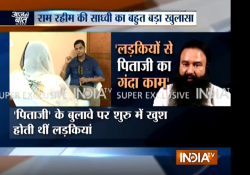 The chilling account of sex pervert Gurmeet Ram Rahim narrated on India TV on Wednesday night by a former sadhvi brings out the weaknesses inherent in our society. The sadhvi alleged that the baba used to rape a woman every six hours and he must have raped nearly 2,000 women till date. One thing is clear: Gurmeet Ram Rahim was a criminal disguised as a fake godman. His followers knew about his shenanigans and dark secrets, but Gurmeet Singh had created an atmosphere of terror among his followers and nobody dared to speak out. Anybody who did so was liquidated. One question arises: when followers knew that the baba was a serial rapist, a criminal and a murderer, why did more than a lakh people gather in Panchkula in a show of solidarity? Why did these followers tell the media that they had come to have a ‘darshan’ (glimpse) of the baba, whom they called ‘pita’ (father)? What can one say about such blind devotion? The moot question is: what can we, as a society, can do to save people from blind devotion? How can we create awareness in our society against such fake godmen?
The chilling account of sex pervert Gurmeet Ram Rahim narrated on India TV on Wednesday night by a former sadhvi brings out the weaknesses inherent in our society. The sadhvi alleged that the baba used to rape a woman every six hours and he must have raped nearly 2,000 women till date. One thing is clear: Gurmeet Ram Rahim was a criminal disguised as a fake godman. His followers knew about his shenanigans and dark secrets, but Gurmeet Singh had created an atmosphere of terror among his followers and nobody dared to speak out. Anybody who did so was liquidated. One question arises: when followers knew that the baba was a serial rapist, a criminal and a murderer, why did more than a lakh people gather in Panchkula in a show of solidarity? Why did these followers tell the media that they had come to have a ‘darshan’ (glimpse) of the baba, whom they called ‘pita’ (father)? What can one say about such blind devotion? The moot question is: what can we, as a society, can do to save people from blind devotion? How can we create awareness in our society against such fake godmen?
Click Here for the Video
Japanese Bullet Train Will Be a Boon for India
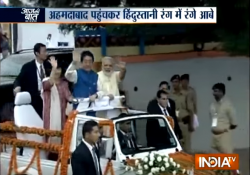 Prime Minister Narendra Modi and the visiting Japanese PM Shinzo Abe took out a roadshow from the airport in Ahmedabad yesterday and were greeted by thousands of admirers. Those who understand politics know that Abe’s visit will prove to be beneficial to BJP in the forthcoming Gujarat assembly elections. But what happened in Ahmedabad on Wednesday was a trailer. The real picture was unveiled on Thursday, when Abe and Modi laid the foundation for the bullet train project. The date for launching the first bullet train between Mumbai and Ahmedabad has been fixed at August 15, 2022. Since the Japanese have taken up the project in their hands, one hopes the project will be completed on time. Japan has been running its bullet train for the last 50 years. It is so punctual that any body can coordinate one’s watch with its arrival and departure timings. In its 50-year-long history, the Japanese bullet train was seldom delayed by barely one minute. Japan will be giving a soft loan of Rs 88,000 crore to India for this Rs 1,10,000 cr project. The loan will be repaid in fifty years, and the repayment will begin after 15 years. The interest rate is at its lowest 0.01 per cent. Naturally, the bullet train will not be a drain on the nation’s treasury or on public finances. The bullet train will take two hours to cover the distance between Ahmedabad and Mumbai. The project will provide jobs to more than 20,000 people.
Prime Minister Narendra Modi and the visiting Japanese PM Shinzo Abe took out a roadshow from the airport in Ahmedabad yesterday and were greeted by thousands of admirers. Those who understand politics know that Abe’s visit will prove to be beneficial to BJP in the forthcoming Gujarat assembly elections. But what happened in Ahmedabad on Wednesday was a trailer. The real picture was unveiled on Thursday, when Abe and Modi laid the foundation for the bullet train project. The date for launching the first bullet train between Mumbai and Ahmedabad has been fixed at August 15, 2022. Since the Japanese have taken up the project in their hands, one hopes the project will be completed on time. Japan has been running its bullet train for the last 50 years. It is so punctual that any body can coordinate one’s watch with its arrival and departure timings. In its 50-year-long history, the Japanese bullet train was seldom delayed by barely one minute. Japan will be giving a soft loan of Rs 88,000 crore to India for this Rs 1,10,000 cr project. The loan will be repaid in fifty years, and the repayment will begin after 15 years. The interest rate is at its lowest 0.01 per cent. Naturally, the bullet train will not be a drain on the nation’s treasury or on public finances. The bullet train will take two hours to cover the distance between Ahmedabad and Mumbai. The project will provide jobs to more than 20,000 people.
Click Here for the Video
Motive still not clear about Pradyumna’s killer
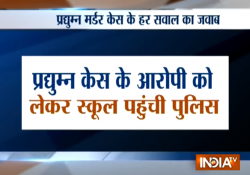 Many of the questions relating to the brutal murder of Pradyumna seem to have been resolved as of now. There was only one killer, the child’s neck was slashed twice with a knife, the victim could not scream because his vocal chord was bleeding, and the killer helped in taking the child to the hospital in order to show that he had nothing to do with murder. The killer was caught, but one vital question begs an answer. What was the motive? Why did the murderer kill the child? He had no enmity with the child, nor was there any sign of sexual assault. The accused had no previous criminal record. What was the reason that triggered the attack? What did the victim see which the killer did not want the world to know. Police is still trying to find the real motive, and we hope the answer will come soon.
Many of the questions relating to the brutal murder of Pradyumna seem to have been resolved as of now. There was only one killer, the child’s neck was slashed twice with a knife, the victim could not scream because his vocal chord was bleeding, and the killer helped in taking the child to the hospital in order to show that he had nothing to do with murder. The killer was caught, but one vital question begs an answer. What was the motive? Why did the murderer kill the child? He had no enmity with the child, nor was there any sign of sexual assault. The accused had no previous criminal record. What was the reason that triggered the attack? What did the victim see which the killer did not want the world to know. Police is still trying to find the real motive, and we hope the answer will come soon.
Click Here to watch Full Episode of Aaj Ki Baat | Follow on Twitter | Like Facebook Page
Safety of Children in Schools is the Prime Concern of All
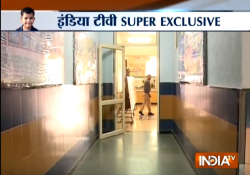 The brutal murder of seven-year-old Pradyumna in Ryan International School, Bhondsi near Gurugram is a stark reminder of the dangers lurking before our school going children across India. There have been many reports of murders, unnatural deaths and sexual assault of minors in schools and other institutions. After nationwide outrage on the streets and in media, the Haryana police has constituted 14 teams to investigate the gruesome murder. Two officials of Ryan group have been arrested. One team has reached Mumbai to question the promoters of the group.
The brutal murder of seven-year-old Pradyumna in Ryan International School, Bhondsi near Gurugram is a stark reminder of the dangers lurking before our school going children across India. There have been many reports of murders, unnatural deaths and sexual assault of minors in schools and other institutions. After nationwide outrage on the streets and in media, the Haryana police has constituted 14 teams to investigate the gruesome murder. Two officials of Ryan group have been arrested. One team has reached Mumbai to question the promoters of the group.
As more revelations are awaited, this reminds us of the infamous Ayushi murder case in Noida several years ago. Ayushi was at her home with parents. She was murdered in cold blood in her bed, but nobody knew. Her body was found the following morning. Till date, the circumstances leading to that murder remain a mystery.
Similarly, facts leading to the murder of Pradyumna seem to be shocking. There were nearly 1,000 students and teachers along with non-teaching staff in the school that day, but nobody heard or saw the boy’s throat being slit inside a washroom. Haryana police have arrested a bus conductor, but police in our country have created such an image about themselves that people seldom trust their investigation. In this case, the conductor was charged with murder within hours and sent to custody. It seems the police hurried up its investigation without tying up all the loose ends. This has raised doubts in the minds of parents. It is not the question of a mother. Every mother has a question about her children studying in schools. Safety of students in schools must be of prime concern to all.
Click Here for the Video
Justice Delayed in Mumbai Serial Blasts Case
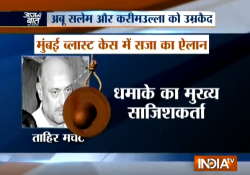 On Thursday, the TADA court in Mumbai sentenced two accused Tahir Merchant and Firoz Khan to death, two others Abu Salem and Karimullah Khan to life term imprisonment and a fifth accused Riyaz Siddiqui to 10 years imprisonment. One accused Abdul Sheikh was acquitted of all charges. I have one comment to make in this regard. It took 24 long years to convict criminals accused of killing 257 innocent people. Those who have been given death sentences have the options to move the High Court and the Supreme Court, and later seek clemency from the President. It is really shameful that the due process of law took such a long time to punish the guilty. Justice delayed is justice denied is an oft-quoted saying. In this case, justice has been delayed for an inordinately long period. This could have been avoided.
On Thursday, the TADA court in Mumbai sentenced two accused Tahir Merchant and Firoz Khan to death, two others Abu Salem and Karimullah Khan to life term imprisonment and a fifth accused Riyaz Siddiqui to 10 years imprisonment. One accused Abdul Sheikh was acquitted of all charges. I have one comment to make in this regard. It took 24 long years to convict criminals accused of killing 257 innocent people. Those who have been given death sentences have the options to move the High Court and the Supreme Court, and later seek clemency from the President. It is really shameful that the due process of law took such a long time to punish the guilty. Justice delayed is justice denied is an oft-quoted saying. In this case, justice has been delayed for an inordinately long period. This could have been avoided.
Click Here for the Video
How a Dera Doing Social Work Was Converted by Ram Rahim Into a ‘Wonderland’
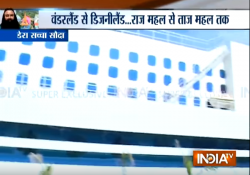 Surprises never cease when one enters Ram Rahim’s sprawling ‘dera’ (ashram) in Sirsa, Haryana. India TV reporter Abhishek Upadhyay was the first to sneak into the dera on Tuesday and Wednesday, even before police and the High Court-appointed team was to enter. After careful study of the visuals of the dera, one arrives at a conclusion that there were two main faces of Ram Rahim’s dera. One: when Ram Rahim’s predecessors opened school, college, hospital, eye bank and meditation centre to provide succour to their followers, and Two: the swanky ‘wonderland’ where cheap replicas of Eiffel Tower, Taj Mahal, St. Peter’s Basilica and Disneyland were erected, along with a huge cricket stadium, a shopping mall and a cinema theatre, among other such luxuries. Ram Rahim spent billions and amassed all the luxuries of life to dazzle the world, particularly his followers. He also built a mysterious cave, a place where he indulged in carnal pleasures, that included rapes and sexual assaults. In short, Ram Rahim converted an ashram doing social work into a vast, sprawling space to mint millions of rupees. Simple, gullible followers went to the dera in search of spiritual enlightenment and education for their offspring, took patients there for treatment, but were befooled in return by their guru. With the masses at his beck and call, Ram Rahim considered himself God, or Messenger of God, and the anti-climax came when the guardians of law caught up with him. He will now have to spend twenty years behind bars.
Surprises never cease when one enters Ram Rahim’s sprawling ‘dera’ (ashram) in Sirsa, Haryana. India TV reporter Abhishek Upadhyay was the first to sneak into the dera on Tuesday and Wednesday, even before police and the High Court-appointed team was to enter. After careful study of the visuals of the dera, one arrives at a conclusion that there were two main faces of Ram Rahim’s dera. One: when Ram Rahim’s predecessors opened school, college, hospital, eye bank and meditation centre to provide succour to their followers, and Two: the swanky ‘wonderland’ where cheap replicas of Eiffel Tower, Taj Mahal, St. Peter’s Basilica and Disneyland were erected, along with a huge cricket stadium, a shopping mall and a cinema theatre, among other such luxuries. Ram Rahim spent billions and amassed all the luxuries of life to dazzle the world, particularly his followers. He also built a mysterious cave, a place where he indulged in carnal pleasures, that included rapes and sexual assaults. In short, Ram Rahim converted an ashram doing social work into a vast, sprawling space to mint millions of rupees. Simple, gullible followers went to the dera in search of spiritual enlightenment and education for their offspring, took patients there for treatment, but were befooled in return by their guru. With the masses at his beck and call, Ram Rahim considered himself God, or Messenger of God, and the anti-climax came when the guardians of law caught up with him. He will now have to spend twenty years behind bars.
Click Here for the Video
India’s Diplomatic Pressure on Pakistan
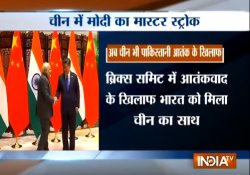 The naming of Lashkar-e-Taiyyaba, Jaish-e-Muhammad, Haqqani network, Tehrik-e-Taliban Pakistan and sundry other terror groups operating from Pakistani soil in the joint declaration adopted at the BRICS summit recently in Xiamen, China, is another blow to Pakistan’s image on the world stage. But it needs to be pointed out here that the very same terror groups were named identically in a similar paragraph in the Amritsar declaration issued at the Heart of Asia Conference last year, soon after the Uri attack. And the signatory to that declaration also included Pakistan. If one compares the two declarations, the paragraph on terrorism looks almost identical. Nevertheless, terror outfit leaders in Pakistan are worried over Pakistan’s “all-weather friend” China not backing its “trusted” neighbor on the issue of terrorism.
The naming of Lashkar-e-Taiyyaba, Jaish-e-Muhammad, Haqqani network, Tehrik-e-Taliban Pakistan and sundry other terror groups operating from Pakistani soil in the joint declaration adopted at the BRICS summit recently in Xiamen, China, is another blow to Pakistan’s image on the world stage. But it needs to be pointed out here that the very same terror groups were named identically in a similar paragraph in the Amritsar declaration issued at the Heart of Asia Conference last year, soon after the Uri attack. And the signatory to that declaration also included Pakistan. If one compares the two declarations, the paragraph on terrorism looks almost identical. Nevertheless, terror outfit leaders in Pakistan are worried over Pakistan’s “all-weather friend” China not backing its “trusted” neighbor on the issue of terrorism.
Not only terror outfits, but most of the Pakistan media have now begun to worry over the dent in the country’s image. It was only three weeks ago that Pakistan had been crowing about its friendship with China during the Doklam standoff. The Pakistani media was singing hosannas to Sino-Pak friendship, and the Pakistani leaders were expecting China “to teach India a lesson”. But the situation has changed 360-degree within a span of 24 hours. Chinese President Xi Jinping seems to have realized that this is not the India of 1962 which can be browbeaten by shrill war cries.
The Chinese leadership has begun to accept that India’s cooperation was necessary if their nation wants to dominate world economy. If terror outfits are a threat to India, they cannot be angels towards China. Chinese President Jinping has spoken about the Panchsheel principles of peaceful co-existence, but India will have to be on its guard.
There is an oft-repeated observation among Indians that Chinese products are normally neither reliable nor durable. So is China’s policy towards India. On one hand, it issues the joint declaration against Pakistani terror groups and on the other hand, China refuses to acknowledge Masood Azhar as a terrorist.
Click Here for the Video
Kangana Ranaut Exposed the Dark Secrets of Bollywood
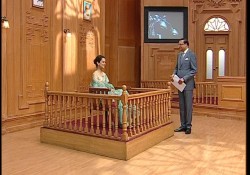 In her explosive interview on my show Aap Ki Adalat (telecast Saturday 10 pm), film actress Kangana Ranaut has hit out at Bollywood biggies in a manner which normally film stars avoid. You will be surprised to know that Kangana spoke for nearly 40 minutes about Hrithik Roshan and disclosed several details, hitherto not known. To be fair, if Hrithik desires to reply to Kangana’s questions, he should also appear in Aap Ki Adalat to put the record straight. If he thinks he had been fair, he should come forward and reply to Kangana’s charges. This is what honesty demands.
In her explosive interview on my show Aap Ki Adalat (telecast Saturday 10 pm), film actress Kangana Ranaut has hit out at Bollywood biggies in a manner which normally film stars avoid. You will be surprised to know that Kangana spoke for nearly 40 minutes about Hrithik Roshan and disclosed several details, hitherto not known. To be fair, if Hrithik desires to reply to Kangana’s questions, he should also appear in Aap Ki Adalat to put the record straight. If he thinks he had been fair, he should come forward and reply to Kangana’s charges. This is what honesty demands.
Kangana has also hit out at Bollywood heavyweight Karan Johar in my show. Karan had hit out at Kangana several times on television, through social media, and on stage shows. At times, he made fun of her English diction, her rise from an obscure village in Himachal Pradesh to the tinsel world of Bollywood. I would also publicly request Karan Johar to appear in my show Aap Ki Adalat and reply to Kangana’s charges if he has the courage. Is it Kangana’s fault that she has no godfather in the film industry? That she does not hail from a ‘big’ family? Is it is her fault that she comes from a small village? Is it her fault that she did not study in a reputed English medium public school? Kangana replied bravely to all these questions, by winning laurels from the public for her superb acting in superhit films like ‘Queen’ ‘Tanu Weds Manu’. Kangana proved to the world that she could become a star on her own by making her films click at the box office.
How Demonetization Has Helped the Economy
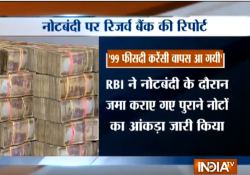 The Reserve Bank of India on Wednesday in its annual report disclosed that 99 per cent of demonetized currency notes returned to the bank’s post demonetization, and only one per cent, amounting to nearly Rs 16,000 crore did not return. Finance Minister Arun Jaitley sought to clarify that only these unreturned currency notes were not black money. Nearly Rs 3 lakh crore currency notes came back to the banking system, and along with this nearly two lakh shell companies were traced. Most of these currency notes were black money being held by shell companies. Jaitley also explained that another big benefit of demonetization was that 56 lakh new taxpayers have joined the tax net. The real motive behind demonetization was (1) bringing black money back to the banking system (2) expanding the tax base and (3) switching the economy to digital mode. According to Jaitley, on all these three counts, the objectives were achieved.
The Reserve Bank of India on Wednesday in its annual report disclosed that 99 per cent of demonetized currency notes returned to the bank’s post demonetization, and only one per cent, amounting to nearly Rs 16,000 crore did not return. Finance Minister Arun Jaitley sought to clarify that only these unreturned currency notes were not black money. Nearly Rs 3 lakh crore currency notes came back to the banking system, and along with this nearly two lakh shell companies were traced. Most of these currency notes were black money being held by shell companies. Jaitley also explained that another big benefit of demonetization was that 56 lakh new taxpayers have joined the tax net. The real motive behind demonetization was (1) bringing black money back to the banking system (2) expanding the tax base and (3) switching the economy to digital mode. According to Jaitley, on all these three counts, the objectives were achieved.
Click Here for the Video
Now is the Time to Expose All Fake Godmen
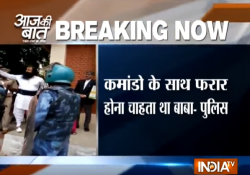 The stunning revelation made by IG India Reserve Battalion K K Rao about a diabolical plan hatched by Gurmeet Ram Rahim to escape from Panchkula court minutes after he was convicted, speaks volumes about the criminal nature of the fake godman. It was clear that Ram Rahim knew he would be convicted by the court, he had asked his men to store firearms inside the vehicles, had brought goons in his cavalcade, and had planned to escape, taking advantage of the bloody mayhem that would have ensued. He could have then posed a big challenge to the establishment, but his plan was nixed in the nick of the time by alert police officers like Rao.
The stunning revelation made by IG India Reserve Battalion K K Rao about a diabolical plan hatched by Gurmeet Ram Rahim to escape from Panchkula court minutes after he was convicted, speaks volumes about the criminal nature of the fake godman. It was clear that Ram Rahim knew he would be convicted by the court, he had asked his men to store firearms inside the vehicles, had brought goons in his cavalcade, and had planned to escape, taking advantage of the bloody mayhem that would have ensued. He could have then posed a big challenge to the establishment, but his plan was nixed in the nick of the time by alert police officers like Rao.
I would also praise retired CBI officer Narayanan who diligently investigated both the rape cases, gave confidence to the rape survivors and ultimately justice prevailed. Narayanan revealed how he was literally forced by political leaders to weaken the case. It exposes the rot that has set in our system. The fake godman was clearly reaping benefits from politicians by offering them support in elections. That is why Ram Rahim was cocksure he would not land in jail because of his ‘high’ political connections. But he was proved wrong. The Punjab and Haryana High Court was very much alert, along with the media this time, and the Special Judge of CBI court did not give him any leeway.
The most surprising thing in the entire sordid episode is how fake godmen like Ram Rahim manage to fool gullible devotees despite committing heinous crimes. He was literally robbing them in the guise of faith. He was using his devotees as shields and was goading them to carry out bloodshed. The irony is: even if one fake godman is exposed, another godman crops up and starts fooling gullible people. The saddest part is that eminent spiritual leaders in our society fail to prevent such fake godmen from engaging in nefarious activities. They are unable to create awareness among the people. This is a work which no government nor any government official can perform. It is the responsibility of spiritual and religious heads. It is the responsibility of the entire society, which includes all of us, including the media. It is only then can we prevent fake godmen from carrying on with their business in the guise of religion and faith.
Click Here for the Video